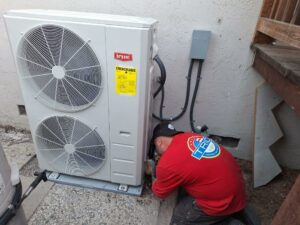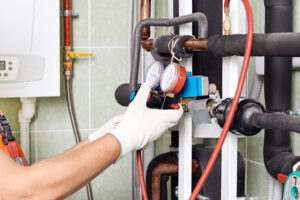How Heating Maintenance Can Improve Your System’s Lifespan
Your heater works hard to keep your home warm throughout the chilly Bay Area winters. However, wear and tear can cause its lifespan to fall short without regular upkeep. Routine tune-ups help catch minor issues before they become more significant problems, boost efficiency, and keep everything working correctly so you can enjoy cozy comfort for years to come. Read on to discover how regular heating system maintenance improves your unit’s lifespan and keeps your home warm and worry-free all winter long.

Why Heating Maintenance Matters
Like any home system, your heater needs regular upkeep to keep everything running smoothly. When you schedule professional heating maintenance, a certified technician inspects, cleans, and tunes up your unit from top to bottom. They check that all parts are working correctly, look for potential hazards, and identify minor issues before they progress. These tasks improve your unit’s efficiency, prevent heating repairs, increase its lifespan, and keep your home safe and warm through the chilly winter months.
Key Benefits of Regular Heating Maintenance
Keeping up with regular heating maintenance offers several benefits that improve home comfort, lower bills, and keep your household safe. By taking care of your system, you’ll avoid unexpected breakdowns, improve energy efficiency, and extend its lifespan. Some of the top perks you’ll see include:
- Lower energy bills: A well-maintained heater uses less energy to warm your home, reducing your utility bills and carbon footprint.
- Fewer repairs: During your heating tune-up, the technician will look for and fix any minor issues before they become bigger, more costly problems.
- A safer household: Regular maintenance helps minimize the risk of dangerous carbon monoxide leaks or electrical issues.
- A longer system lifespan: Routine maintenance prevents excessive wear and tear, helping your heater run for years to come.
- Consistent home comfort: With your heater running smoothly, you won’t have to worry about uneven temperatures, poor airflow, or breakdowns keeping you in the cold.
Signs Your Heating System Needs Maintenance
It’s important to schedule a heating system checkup at least once a year to keep your unit running in top condition. If it’s been over a year since your last heating service or you can’t seem to remember when your last service was, it’s a good idea to schedule maintenance. Some other key signs that your heater is overdue for a tune-up include:
- Rising energy bills: A poorly maintained heater uses more energy to warm your home, causing your heating bills to increase.
- A yellow pilot light: Your furnace pilot light should always be bright blue. If it looks yellow, there may be a carbon monoxide leak that requires immediate service.
- Excess dust near the vents: Unchanged or dirty filters cause dust to build up around the vents, decreasing indoor air quality and blocking airflow.
- Strange noises: Grinding, rattling, or banging noises can indicate internal issues that need attention.
- Inefficient heating: If your house takes forever to warm up, your heater may struggle to function due to wear and tear.
- Strange odors: Burning or other foul odors from your heater often indicate dust buildup or mechanical issues requiring service.
How Maintenance Helps Extend Your System’s Lifespan
While most heating systems last 10 to 15 years, regular maintenance can help your unit reach and even exceed this lifespan. Regular upkeep, such as lubricating moving parts, tightening connections, and performing other key tasks, keeps your heater in top condition while reducing wear and tear. By limiting the strain on your system, you’ll boost its lifespan and prevent the need for costly repairs or early replacement.

DIY vs. Professional Heating Maintenance
When it comes time for your annual heating tune-up, you may be tempted to do the job yourself. While you can perform a few DIY tasks to keep things running smoothly until your next service, heating maintenance should always be left to the professionals.
Certified HVAC technicians have the skills and experience to perform a comprehensive maintenance checklist, ensuring that all components receive a thorough inspection, cleaning, and tune-up. They can also spot worn-out or failing components that an untrained eye might overlook, helping to prevent more significant, costly issues.
With a professional service, you can rest easy knowing that your heater is in optimal condition, free from safety hazards, and running efficiently for years.
How Often Should You Schedule Heating Maintenance?
It’s important to schedule maintenance at least once a year to prevent breakdowns and keep your heater running efficiently. The best time to book your tune-up is in late summer or early fall before peak heating season begins. This timing helps prepare your heater for the cold winter temperatures ahead.
With a full inspection of your unit during this time, you won’t have to worry about unexpected breakdowns or major issues impacting your home comfort. The technician will catch and repair any minor problems, preventing them from progressing into major repairs. With annual maintenance, you’ll improve your unit’s efficiency and extend your HVAC’s lifespan, keeping your home warm and cozy for many winters ahead.
Call Trio to Schedule Professional Heating Maintenance Today!
Keep your home warm and cozy for years with professional heating maintenance from the team at Trio. Our experts offer five-star furnace tune-ups throughout the Greater San Francisco Bay Area that extend your HVAC’s lifespan, improve energy efficiency, and prevent costly repairs. Don’t wait for a breakdown to schedule service. Call our team to book your annual tune-up today!
Want to take your heating maintenance to the next level? Join our maintenance Membership Program to receive bi-annual 29-point HVAC tune-ups, priority service, and other VIP benefits.
